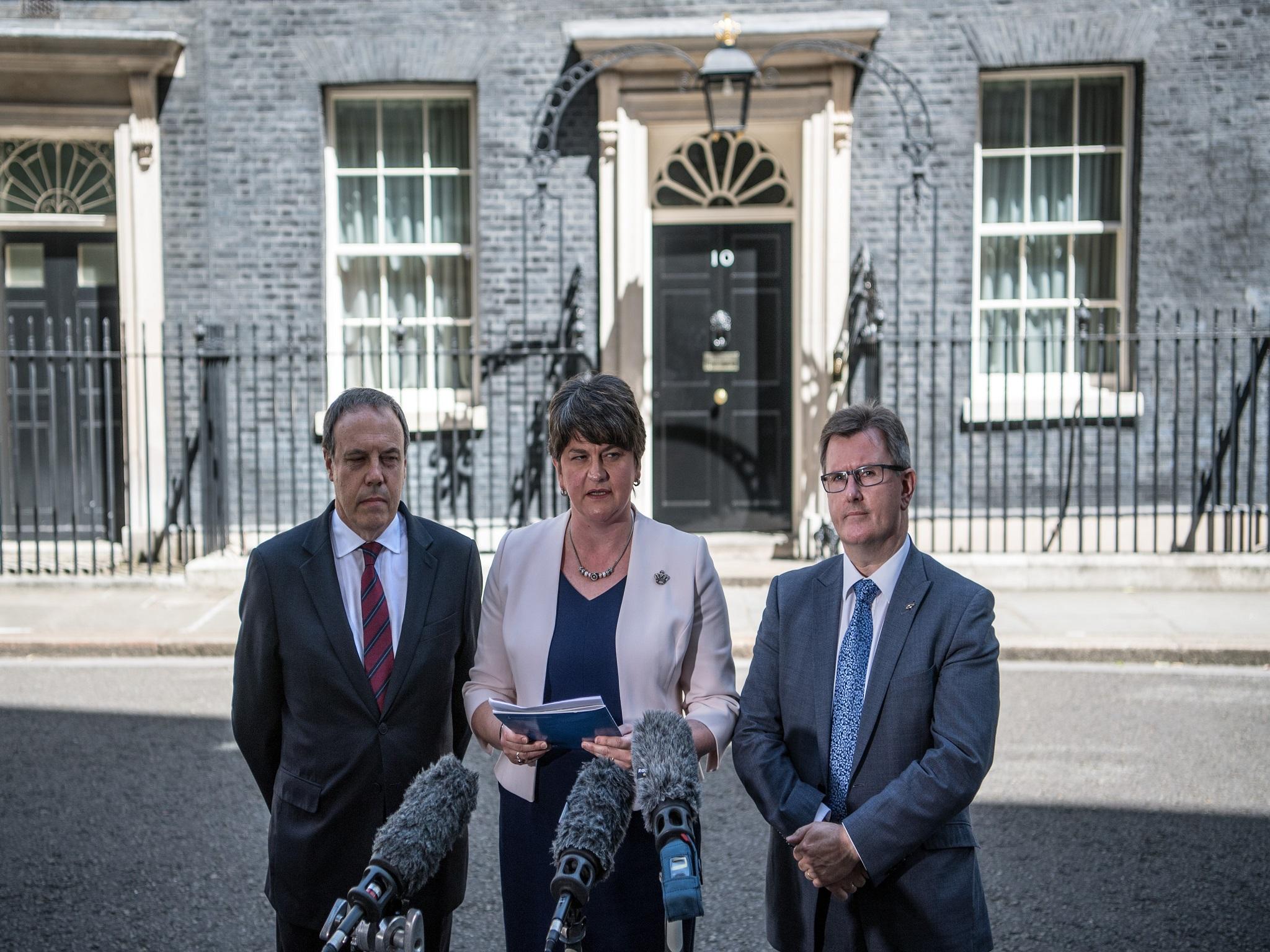This Tory-DUP deal really is a pact with the Devil
The 2017 election was the revenge of the Remainers, and May is doing her best to pretend it never happened – to tell herself and the world that ‘nothing has changed’ when the rise of Jeremy Corbyn suggests that everything has

And with one bound she was free – or was she?
At a cost of £1bn of taxpayer’s money – around £500 for every Northern Irishman, woman and child – the Conservatives have bought themselves precious time and frustrated Jeremy Corbyn’s hopes of sliding into No 10 through some parliamentary accident.
Theresa May’s Faustian pact with the Democratic Unionist Party, signed after a good deal of haggling, seems to secure her position, that of her party and, most importantly, of Brexit for the next two years at least. In a sense, and by an extremely circuitous route, she might even claim to have delivered “strong and stable” government, though even Theresa May, newly pledged to “humility”, hasn’t the chutzpah to revive that old slogan. With the Paisleyites, her position remains precarious, and a few defections or by-election losses would be sufficient to make it untenable.
The two-year horizon set out in the accord would take the nation to the formal point of departure of the UK from the EU, whatever “transitional” arrangements may be put in place for after that point. That, Tories are obviously supposing, is also the point when the ill-starred May premiership passes into history with as much dignity as it can muster, and the Conservatives start the process of recovery under fresh leadership in the exciting new world of post-Brexit Britain. She, as she recently said to her MPs, had gotten us in this mess and she was the best person to get us out of it. Maybe she isn’t, but they rightly calculate that the mayhem caused by a further leadership contest would stretch them beyond breaking point. So the course of the next two years seems set.
The document, indeed, goes beyond a traditional confidence and supply agreement – which doesn’t require a grand constitution in any case – but not as far as a full coalition. It agrees priorities for government and also commits the DUP to support the Brexit legislation, even though no one has any idea what will be in it. It most resembles the Lib-Lab pact of the 1970s, negotiated between a stricken minority Labour administration led by James Callaghan and the Liberals then led by David Steel: not exactly cosy, but more than a purely transactional relationship as well.
Therein lies the danger. Ever since John Major’s government declared that it had no “selfish interest” in the continuance of British rule in Northern Ireland, the UK government has taken a studiously neutral role there. It was the only way to bring the sides together. This agreement ends that policy at a stroke: “The Conservative Party will never be neutral in expressing its support for the Union.” A brave, antique declaration that is also highly incendiary and deeply insensitive.
Entirely predictably, Sinn Fein has denounced the DUP-Tory pact, and there will be no return to power-sharing while it is in force. There will be a political vacuum in Northern Ireland, and that has always been a dangerous position.
Ms May has taken considerable risks with the peace process, and ones she has been warned about by John Major, Tony Blair and others who understand it better than she does. Whatever advice she has been taking on this step has not been sound.
The Irish government is one of the few allies the UK will have in its Brexit odyssey; this pact is not a friendly gesture to them. Militant republicans need little prompting to return to old habits when they can say that politics has failed the people of the North, and the armed struggle is the only option left to them. The spiral of violence could all too easily resume. It is a sickening prospect.
She is also risking the UK in another way. In offering the DUP a “coordination committee”, the suspicion is that she has provided a flimsy cover for the DUP retaining a permanent veto on the Brexit process – one that the other administrations and parties in Scotland, Wales, and UK-wide for that matter are denied. Brexit will be forced through despite the wishes of what may well be a majority of the population against hard Brexit. A constitutional and political crisis looms. Ms May might have been able to pull hard Brexit off with the Tory majority David Cameron secured in 2015, plus the referendum mandate. After her self-inflicted wound of a snap election, she cannot.
The 2017 election was the revenge of the Remainers, and she is doing her best to pretend it never happened – to tell herself and the world that “nothing has changed” when the rise of Jeremy Corbyn suggests that everything has. Still, the atavistic DUP is an ideal partner for anyone wishing to live in the past.
This agreement ranges far and wide beyond the narrow obligations of saving a minority Conservative government in the last resort. That would be bad enough, but we have also the prospect of crash landing outside the EU with no new treaty in place in 2019, plus a return to the Troubles in Ireland to look forward to. This really is a pact with the Devil.

Join our commenting forum
Join thought-provoking conversations, follow other Independent readers and see their replies